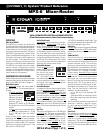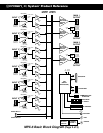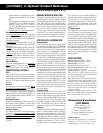
@crown
®
* System
®
Product Reference
MPX-6 Mixer (Page 3 of 3)
• May serve as interface for com-
ponents connected to the Crown
Bus.
• Components supported include
other MPX units, SMX-6 mixers,
AMB-5 mixers, PIP-AP, PIP-APM,
PIP-APS, all MRX matrixers, and the
White 4700 Series EQ.
• No support for U-Code protocol.
Setup Switches:
• The IQ Address is set by an 8 seg-
ment DIP switch. Valid address values
are 1 to 250 (0 and 251-255 are reserved
for system usage).
• RS232/422 Standard switch must be
configured appropriately for use of the
serial port.
• Baud is adjustable via DIP switch up
to 19200. This setting must be config-
ured properly for use of the serial port.
• Parity is set ON or OFF and ODD or
EVEN via DIP switch. Normally set to
OFF, this setting only applies to use of
the serial port.
Memory Backup:
The unit is equipped with a recharge-
able battery. The unit has 60 day
memory backup on full charge.
COMPUTERIZED FEATURES
DSPI:
The Data Signal Presence Indicator
(DSPI) light on the front panel flashes to
indicate data traffic addressed to or from
the unit. This light may be forced on from
software.
Aux Port:
The aux port on the mixer is used to send
or receive a control voltage. From soft-
ware you may turn the aux output on or
off. IQ software is also able to sense the
status of the aux input and is capable of
taking independent action based on a
sensed input.
Bus Output Relays:
Audio bus outputs are identical to their
respective main outputs in every way
except for the addition of software con-
trolled isolation relays.
VCA Gain Control:
The heart of the MPX is its functionality
as a mixer. Each of the six main inputs
may be routed to either or both outputs
by VCAs under processor control. The
VCAs offer a control range of –100 to
+25 dB.
MANUAL MIXING IN REAL TIME
All setup is accomplished with IQ soft-
ware from a PC. You may make changes
from software that affect VCA gain in real
time. Gain may also be manipulated in
real time from alternate control devices
such as a Drone or a third party control
device (Ex. AMX, Crestron, Interface
Controls, etc.). Once VCA gains are set
from the PC (or control device) the pro-
cessor maintains that gain structure un-
til it receives an instruction to change.
SYSTEM LEVEL INFORMATION
Communication:
In an IQ System the basic communica-
tion structure is based on the premise
that it must be able to support a PC be-
ing used with several IQ components.
The computer is connected to the IQ
System interface via RS232. The inter-
face converts the protocol from RS232
to Crown Bus media and back again. In
a small system or a single MPX system
the MPX itself may serve as the system
interface. The IQ-INT II, IQ-PSI, Drone,
SMX-6, AMB-5 and MPX-6 are all com-
ponents which may serve as a system
interface for an MPX-6. The Crown Bus
is a serial data loop carrier of IQ com-
mand protocol. Crown has implemented
it as a two wire twisted pair current loop
to allow for low cost long distance con-
nections. For very long loops (over 1000
feet) data repeaters (IQ-RPT) or fiber
optic cable may be used to connect
equipment rooms that are some dis-
tance apart. The Crown Bus itself does
not carry audio.
U-Code Protocol:
U-Code is new form of IQ command
protocol developed for enhanced new
product and third party product devel-
opment. At this time the MPX-6 firmware
is not written in U-Code. Although it may
be used in systems with U-Code prod-
ucts, the MPX-6 may not be used as
system interface for U-Code products.
Software:
Several IQ Software packages are avail-
able to communicate with an MPX-6.
Each unit is shipped with basic DOS
software which allows you to communi-
cate with the SMX-6, AMB-5, MPX-6,
and MRX Matrixer units. More advanced
software includes the Turbo or Sys-
Config software packages. Turbo is a
DOS program that includes powerful
graphics support and support of the full
IQ product line. Sys-Config is an ad-
vanced package which has security,
scheduling, alert reporting, and other
powerful features plus the power of
Turbo built in.
PC Requirements:
The computer you select for use with
your IQ System is very important. Exact
minimum requirement vary depending
on the software package being used,
but for the more advanced software your
machine should at least be a 486SX/33
with the following: 4 MB RAM, 16550
UART for the com port used by IQ, DOS
6.2, Mouse (with DOS driver, third but-
ton features supported). In most cases
Turbo software will operate as a DOS
application from Windows,
®
including
Windows 95.
®
SPECIFICATIONS
Maximum Input Level (Mic): +7 dBu.
Maximum Input Level (Line): +32 dBu.
Phantom Power: +44 VDC.
AC Power: 120/240 VAC 50/60 Hz.
Common Mode Rejection: 55 dB: 60 to 1 kHz
typical; 45 dB: 20 to 20 kHz.
Frequency Response: +0/-1 dB, 20 to 20 kHz.
THD: <0.05% at +4 dBm output; <0.15% at
+20 dBm output 20 to 20 kHz measured at
mic input with 40 dB gain.
Noise: Output noise all inputs off is –80dBu
(106 dB below rated output); output noise
with one line input at 0 dB is 80 dB; equiva-
lent input noise at mic input with 46 dB of
gain and 150 ohm source is –125 dBu. Note
that noise specs are typical, unweighted,
and 20 to 20 kHz.
Crosstalk: Adjacent inputs/outputs at 1 kHz
better than –80 dB; adjacent inputs/outputs
20 to 20 kHz better than –65 dB.
Guaranteed Excellence
@crown
Crown International, Inc.
Professional Audio Division
PO Box 1000
Elkhart, IN 46515-1000
Ph. 800-342-6939/219-294-8200
Fax. 219-294-8301
Trademark Notice:
Algo,
™
Distributed Intelligence,
™
and
MPX-6
™
are
trademarks,
Crown
®
and
IQ System
®
are regis-
tered trademarks of Crown International Inc.





